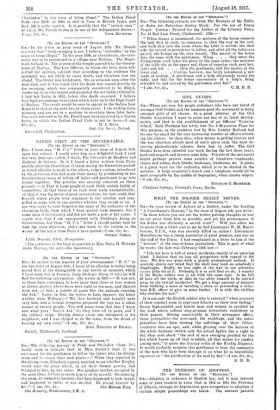WHAT THE SOLDIER REALLY THINKS.
(To THE EMT= or THE " Specraroa."1 Sut,—In your review of Letters of a Soldier, under the heading " A Frenchman's Message," in the issue of August 4th, you write : "In these letters you can see the writer putting thoughts of war as far away from him as possible, and yet his performance of his duties was obviously a sacred trust." Will you allow me to quote from a letter sent to mo by 2nd Lieutenant \V. H. Hurst. bourne, R.F.A., who was recently killed in action? Lieutenant Huretbourne was a young journalist of great promise, and was on the staff of the Times. I had complained in a letter to him of the " heroics" of the stay-at-home journalists. This is part of what he wrote; the date was February 14th last:— "Life out here is full of minor incidents—mostly of an amusing kind. I believe that we lose all perspective with regard to the war. We fire our guns with a purely professional outlook. It scarcely enters our mind that the shell may land on somebody's diaphragm. Really, we lose sight of the war in our attention to our little bit of it. Probably it is as well that we do. I wonder if the Roche soldier sees it all with the same eyes. Is he full of hate all the while, or does he too allow himself to be carried away by the trivial incidents? We get a huge amount of interest from building a mess or mending a stove or persuading a reluc- tant R.E. officer to give us some timber. It is only the civilian who realizes the war."
It is not only the British soldier who is annoyed " when accounts of their conduct seem to represent hilarity as their true feeling." Every high-minded and honest man and woman is revolted by the stuff which callous stay-at-home journalists contribute to their papers. Sitting comfortably in their newspaper offices, these journalists—the over-aged, the weaklings, and the indis- pensables—have been turning the sufferings of their fellow- creatures into an epic, and, while glossing over the horrors of the whole business (which only the actual fighter has a right to do), they cant about "the soul of men emerging purified by the fire which burns up all that is selfish, all that makes for conflict among men," to quote the literary critic of the Weekly Dispatch. It would probably surprise this gentleman to hear the comments of the men who have been through it on what he so beautifully expresses as " the purification of the soul by fire."—I am, Sir, de, . S. H. D.


























 Previous page
Previous page